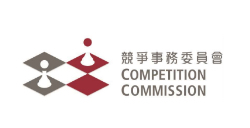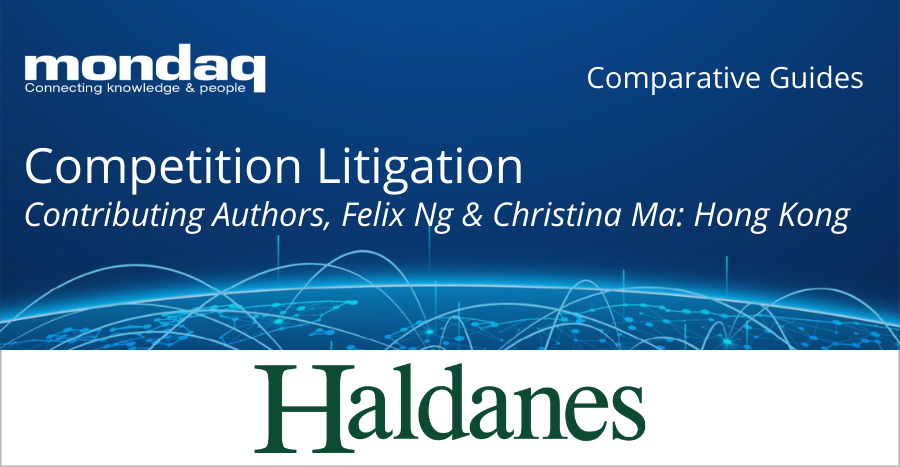Haldanes’ Practical Guide 2021 to Competition Commission investigations

Our Partner Felix Ng, Consultant Olivia Fung, Associates Christina Ma and Able Au authored the 2021 edition of the Cartels and Leniency Review – Hong Kong Chapter published by the Law Reviews in the United Kingdom, analysing the statutory framework and enforcement regime of the Competition Ordinance while reviewing the latest developments on the Competition Commission (“the Commission”)’s leniency programmes and the Competition Tribunal’s (“the Tribunal”) recent judgments.
2021 marks the sixth year of operation of the Hong Kong antitrust enforcement regime. Thus far, Haldanes has not only advised multinational corporations on the compliance issues under the Competition Ordinance (Cap 619, “the Ordinance”), but also represented senior executives in Competition Commission investigations, particularly with respect to Section 41 Production Notices, Section 42 Investigation Interviews and applications for leniency.
With our wealth of experience in competition investigations, this article sets out our practical guidance to individuals and undertakings to navigate the relatively new antitrust legislation.
1. The regulatory framework
Enacted in June 2012 and came into full force on 14 December 2015, the Ordinance prohibits three major forms of anti-competitive practices, namely:
- Anticompetitive agreements and cartel activities (The First Conduct Rule);
- Abuse of a substantial degree of market power (The Second Conduct Rule); and
- Control of any merger that has or is likely to have the effect of substantially reducing competition (The Merger Rule).
The Commission is vested with extensive powers to investigate suspected cartel activities and other suspected breaches of the Ordinance, including:-
- Requiring production of documents and information (commonly referred to by the Commission as a “Section 41 Notice”);
- Requiring individuals to attend interviews before the Commission (a “Section 42 Notice”);
- Conducting ‘dawn raids’ by entering and searching premises with warrants issued by the Court of First Instance (Section 48);
- Commencing enforcement actions (such as issuing a warning notice or an infringement notice) and bringing proceedings before the Tribunal.
The Tribunal is an independent adjudicating body that hears applications made by the Commission regarding any alleged contravention of the Ordinance, applications for the review of determinations by the Commission, follow-on private actions, etc.
2. Competition Commission’s recent enforcement actions
In the first five years of enforcement, we notice that the Commission has placed strong emphasis on combating potential violations of the First Conduct Rule, especially on serious anticompetitive conduct such as price-fixing, bid-rigging and market sharing between competitors.
(i) First Conduct Rule
Under Section 6 of the Ordinance, a violation of the First Conduct Rule takes place when corporations or individuals come into agreement or concerted practice with “the object or effect of preventing, restricting or distorting competition in Hong Kong”. Classic examples of cartel activities were brought before the Tribunal over the years:
- In Competition Commission v. Nutanix Hong Kong Limited and others (CTEA 1/2017), four information technology firms were found to have contravened the First Conduct Rule by exchanging quotation information on specific bids for the supply and installation of computer server systems.
- In Competition Commission v W. Hing Construction Company Limited & Others (CTEA 2/2017), the Tribunal found that the ten decoration contractors had contravened the First Conduct Rule by engaging in market sharing and price-fixing arrangements, whereby each of them was allocated designated floors of a public housing estate when carrying out decoration work for individual tenants.
(ii) Second Conduct Rule
It is noteworthy that, in December 2020, the Commission brought the very first case of Second Conduct Rule (abuse of substantial market power) to the Tribunal. The Commission alleges the respondents abused its de facto monopoly position in the medical gases supply market and engaged in various exclusionary acts, from unjustified denial of supply to downstream service providers, to the imposition of various arbitrary and unreasonable trading terms so that the downstream providers cannot compete and perform services properly.
It is anticipated that this will be a significant test case on the Second Conduct Rule, and the future Tribunal rulings shall clarify the essential elements of what would constitute an abuse of substantial market power under Section 21 of the Ordinance.
3. Handling dawn raids and investigation actions
(i) Duty to co-operate
First and foremost, individuals and corporations are under a duty to cooperate with the Commission in competition investigations, failing which they may be liable to criminal sanctions. The Ordinance also stipulates criminal offences for providing false and misleading information, destroying or falsifying documents, obstructing a search or disclosing confidential information provided by the Commission (except for obtaining legal advice).
Hence, it would be crucial for individuals and corporations to timely handle the Commission’s inquiries, while bearing their rights and obligations in mind.
(ii) No right of silence
In the event that a Section 42 Notice (Notice of Interview) or a Section 41 Notice (Notice of Production of Documents) is issued, the person concerned cannot remain silent at investigation interviews or refuse to produce documents or offer explanations based on the right against self-incrimination. Nonetheless, the evidence obtained by the Commission under these notices is not admissible against the person in any criminal proceedings, or proceedings concerning financial or pecuniary penalties.
(iii) Legal Professional Privilege
During dawn raids, the scope and contents of the search warrants issued by the court should be checked carefully to ascertain if the Commission has the authority to enter the premises concerned and seize the relevant documents, computers and other electronic devices.
There are provisions in the Ordinance and various guidelines published by the Commission on the protection of legal professional privilege (“LPP”). Generally speaking, LPP applies to confidential communications with lawyers that are made for the dominant purpose of obtaining legal advice, and communications with respect to an existing or a contemplated litigation. It would be crucial to assert a claim over LPP-protected materials during the execution of a search warrant, and the Commission is not allowed to review such materials unless and until the issue is resolved.
(iv) Key to handling a dawn raid
The key to handling a dawn raid is to have trained staff on the premises to assist with the investigations, and to expeditiously engage external legal counsel, particularly on contentious matters such as LPP claims.
It is vital to appoint an in-house counsel or a compliance officer ready to act as a dawn raid coordinator and to train key employees, who may include the receptionist, heads of various departments, information technology staff and the in-house legal team.
4. Leniency Policies
If you discover a cartel conduct during your employment or business transactions, you are encouraged to take the initiative to report it to the Commission as “whistleblower” to avoid liabilities and penalties. The Commission’s leniency programme is available to both undertakings (e.g. corporations) and individuals alike.
(i) Leniency for Undertakings
The first undertaking which reports the cartel to the Commission and meets all the requirements for leniency is eligible for two types of leniencies under the revised Leniency Policy for Undertakings Engaged in Cartel Conduct:
- Type 1 leniency: for an undertaking that uncovers its participation in a cartel of which the Commission has not commenced an investigation;
- Type 2 leniency: for an undertaking which provides substantial assistance to the Commission’s investigation and enforcement action of a cartel it is already assessing or investigating.
(ii) Leniency for Individuals
The Commission’s Leniency Policy for Individuals was recently implemented in April 2020. Except in circumstances where leniency has been granted to an undertaking, the first individual who terminates his participation in the cartel conduct, makes a report to the Commission and cooperates in bringing proceedings against other members of the cartel can be considered for leniency.
5. Penalties and remedies
Following an investigation, the Commission may take out the enforcement actions below:
- Issue a warning notice requiring an undertaking to cease the cartel conduct in question (applicable to behaviour which does not amount to ‘serious anticompetitive conduct)’;
- Initiate proceedings at the Tribunal; or
- Issue an infringement notice setting out the terms on which the Commission would be willing to settle the matter without commencing proceedings at the Tribunal.
If the Tribunal determines that a certain act contravened the First Conduct Rule, it may impose pecuniary and/or non-pecuniary penalties, including:
- Fines up to 10% of the Hong Kong turnover of the undertaking for each year in which the contravention occurred, for a maximum of 3 years;
- Damages;
- Disgorgement of profits;
- Investigation costs of the Commission;
- Contractual and behavioural sanctions against the infringing undertaking or person;
- Director disqualification orders.
6. Our services
Haldanes has substantive experience in advising local and international clients on competition and anti-trust issues. Our services include:
- Advising clients on potential anti-competitive conduct under the First Conduct Rule and Second Conduct Rule;
- Representing clients in handling investigation interviews, production notices and dawn raids by the Competition Commission;
- Defending clients in Competition Tribunal proceedings;
- Designing internal controls and compliance procedures for clients;
- Providing training to company staff on the Competition Ordinance;
- Drafting and reviewing commercial agreements to ensure that they are not considered anti-competitive.
For further details of our antitrust & competition law practice, please visit: https://www.haldanes.com/practice-areas/antitrust-competition-law/


